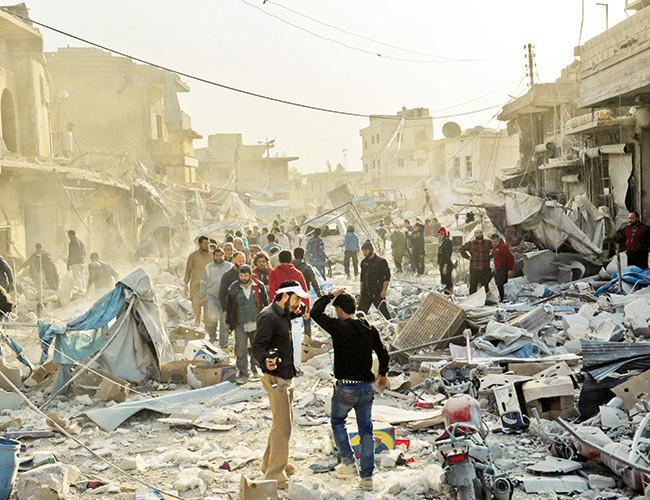
The leaders of Turkey, Russia and Iran are set to meet at a crucial presidential summit in Sochi on Nov. 22 to discuss the political future of Syria, amid hope that the civil war is coming to an end and victory against jihadist groups is imminent.
Russian President Vladimir Putin will host President Recep Tayyip Erdoğan and Iranian President Hassan Rouhani in the Black Sea resort town after a series of trilateral political and military meetings on Syria.
“We will hold very important meetings during the [Nov. 22] meetings [in Sochi] that concern the future of our region. Developments in Syria and Iraq that concern us oblige us to produce mechanisms to generate our own solutions,” Erdoğan said in an address at parliament on Nov. 21.
The “mechanism” he was referring to is the Astana Process, which has secured a lasting truce between the Syrian army and moderate opposition groups since early 2017. Ankara, Moscow and Tehran have declared themselves “guarantors” of the peace process and have recently agreed on the establishment of de-escalation zones in different parts of the war-torn country.
“Although we still have disagreements on some issues, the results we have yielded as a result of our close cooperation with Russia are quite significant,” Erdoğan said, while expressing Ankara’s satisfaction over Iran’s “increasing respect for Turkey’s sensitivities in the Syrian field.”
The three-way summit in Sochi follows a bilateral meeting between Erdoğan and Putin on Nov. 13 in which the two leaders expressed their verbal agreement on the need to launch means for a political solution in Syria. Two leaders agreed to hold a trilateral summit in Sochi with the participation of Iran during that meeting.
On Nov. 19, Russian Foreign Minister Sergei Lavrov, Turkish Foreign Minister Mevlüt Çavuşoğlu and Iranian Foreign Minister Javad Zarif came together in Antalya for initial talks about how to proceed for a political solution. During the meeting Çavuşoğlu underscored the importance of crafting a new Syrian constitution with the participation of moderate opposition groups but without the Syrian Kurdish Democratic Union Party (PYD), which Ankara considers as a terrorist organization because of its links with the outlawed Kurdistan Workers’ Party (PKK).
Turkey has repeatedly stated that it will not take part in any effort for providing a political solution to the Syrian question if the PYD is also present.
Top soldiers meet ahead of summit
Meanwhile, the top soldiers of three guarantor countries met in Sochi on Nov. 21 to review ongoing joint efforts to establish de-escalation zones in Idlib and elsewhere as part of the Astana Process.
Turkish Chief of General Staff Hulusi Akar, Russian Chief of General Staff Valery Gerasimov and Iranian Chief of General Staff Mohamed Bagheri came together in Sochi, the Turkish Armed Forces announced early on Nov. 21.
The three were expected to discuss ongoing efforts to cement the ceasefire in Syria, particularly in rebel-held Idlib, where Turkey is tasked with monitoring a ceasefire through observation spots. Russia is monitoring it from outside, according to the Astana agreement.
Turkey has established two observation spots in Idlib so far and wants Russian and Iranian contribution for the establishment of the remaining 10.
Three top soldiers have agreed to fully clear Syria of militants from the al-Nusra Front and the Islamic State of Iraq and the Levant (ISIL).
Turkey wants YPG’s removal from Afrin
Another key issue for Ankara is the removal of the PYD’s armed wing, the People’s Protection Units (YPG), from Afrin, a region in northern Syria bordering Turkey. President Erdoğan has repeatedly stressed that the YPG poses a national threat to Turkey, which will take all necessary steps.
Russia still has some military deployment in Afrin and Erdoğan has requested to Putin that they withdraw from the region so that Turkey can take own measures to secure its borders. Turkey recently stepped up its military deployment near Afrin.
"Afrin is more important for us because it has a border with us. Around 50 percent of the population is Arab. Our Arab brothers who live in camps [in Turkey] are returning to their homes. In one part [of Afrin] there are Kurds and in another one there are Turkmens,” Erdoğan said.
‘Assad is still in his place’
In his address at parliament on Nov. 21, Erdoğan stressed that the situations in Iraq and Syria remain grave.
“Not even an inch of progress has been made for the peace and comfort of either country. In many places, one terror organization has been replaced by another one. The al-Assad regime, which has the blood of hundreds of thousands of citizens, remains in place,” he said.